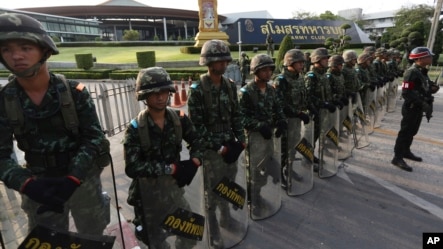Photogallery Army Stages Coup in Thailand, Suspends Constitution
BANGKOK — Thailand’s military coup leaders suspended the nation’s constitution and ordered the country’s acting prime minister and cabinet to report to the army on Thursday, two days after the army chief imposed martial law.
Thailand’s army chief, Gen. Prayuth Chan-Ocha, flanked by the heads of the armed forces, appeared on all major television stations late Thursday afternoon and declared the military and police are now running the kingdom’s government.
Prayuth said it is necessary for the military and police to “take control of governing the country.” He said the army will restore order and push through political reform.
The military later ordered remaining members of the caretaker cabinet, including acting Prime Minister Niwattumrong Boonsongpaisan, to turn themselves in to the main army office in Bangkok.
Niwattumrong was not among those attending the talks and his whereabouts are currently unknown.
Rival political parties
The coup statement followed a second day of crisis talks between rival political parties. Witnesses said the participants in the talks were taken away by soldiers after the talks failed to achieve a compromise between the opposition and supporters of ex-Prime Minister Thaksin Shinawatra.
Following the announcement, soldiers moved in to clear the two main protest sites where both pro- and anti-government demonstrators have held rallies in recent days. They dispersed crowds and detained several leaders.
Thailand’s army also told all television and radio stations in the country to halt normal programs on Thursday and only broadcast army material, according to Reuters.
“All radio and television stations, satellite and cable, must stop normal programming and broadcast army content until told otherwise,” Winthai Suvaree, a deputy army spokesman, said in a televised statement.
Foreign broadcasters and Internet service appeared unaffected.
The pro-government Red Shirts, encamped just to the west of the capital, remained defiant despite the military announcement.
A Twitter message from the United Front for Democracy against Dictatorship (UDD) warned to “stand by for retaliation.”
Earlier Thursday, representatives of the embattled caretaker government, the two major rival political parties and the election commissioner had met at the Army Club. They had been sent home after the first day with “homework,” according to the military, and told to return with proposals to end the country’s protracted political impasse.
After the group failed to reach an agreement, political leaders were taken into custody. Minutes later, Prayuth appeared on television to announce the military takeover.
Deadly protests
Anti-government demonstrators have rallied in Bangkok for six months. During that time, at least 28 people have died and more than 700 have been injured in violence connected to political protests.
The roots of the political standoff go back years.
On one side, royalists and allied groups sought to rid the country of the influence of billionaire Thaksin, whose parties and candidates have won every election since 2001.
Thaksin was ousted as prime minister in a 2006 military coup that sparked a major power struggle. He now lives in self-imposed exile to avoid a prison sentence for a corruption conviction. He and his supporters call the charges political motivated.
Thailand’s army, which has been traditionally on the side of the opposition, has staged 11 coups in the last 80 years.
“Thailand is extremely polarized. The military is not neutral. It does favor the monarchy and this now could lead to resistance to military rule. It’s like a déjà vu all over again 2006,” said Carl Thayer, a professor of politics from the University of New South Wales in Australia.
The military coup in 2006 led to changes in the country’s constitution that were intended to set up a more stable political system.
Some information for this report provided by Reuters, AP and AFP.

